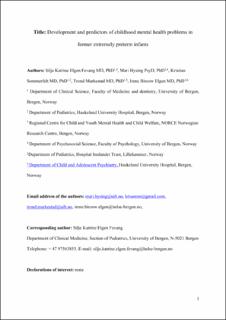| dc.contributor.author | Fevang, Silje Katrine Elgen | |
| dc.contributor.author | Hysing, Mari | |
| dc.contributor.author | Sommerfelt, Kristian | |
| dc.contributor.author | Markestad, Trond | |
| dc.contributor.author | Elgen, Irene Bircow | |
| dc.date.accessioned | 2020-03-26T14:20:07Z | |
| dc.date.available | 2020-03-26T14:20:07Z | |
| dc.date.created | 2019-09-05T17:12:04Z | |
| dc.date.issued | 2019 | |
| dc.identifier.citation | Early Human Development. 2019, 135 44-49. | |
| dc.identifier.issn | 0378-3782 | |
| dc.identifier.uri | https://hdl.handle.net/11250/2648928 | |
| dc.description.abstract | Objective To investigate development and predictors of mental health problems from five to eleven years of age in children born extremely preterm (EP). Method In a national Norwegian cohort of children born before a gestational age of 28 weeks or with a birthweight <1000 g mental health was assessed by parents at five and eleven years of age using The Strengths and Difficulties Questionnaire. A Total Difficulties Score ≥ 90th percentile (TDS90) for a reference group was used as a measure of a mental health problem. Of 338 eligible EP children, 162 (48%) attended at both ages. Results The rate of TDS90 was 52 (32%) at five and 37 (23%) at eleven years of age ( p = 0.025). Of the 52 children with TDS90 at five years, 25 had TDS90 at eleven years of age, and of 37 children with TDS90 at eleven, 25 had TDS90 at five years of age. Mental health problems and an IQ of 70–84 at five years were independent predictors of TDS90 at eleven years of age. Conclusion The rate of mental health problems decreased from five to eleven years, but individual stability was moderate. Mental health problems and intellectual function in the lower normal range at preschool age were independent predictors of later mental health problems. | |
| dc.language.iso | eng | |
| dc.rights | CC BY-NC-ND 4.0 | |
| dc.rights.uri | https://creativecommons.org/licenses/by-nc-nd/4.0 | |
| dc.title | Development and predictors of childhood mental health problems in former extremely preterm infants | |
| dc.type | Peer reviewed | |
| dc.type | Journal article | |
| dc.description.version | acceptedVersion | |
| cristin.ispublished | true | |
| cristin.qualitycode | 1 | |
| dc.identifier.doi | 10.1016/j.earlhumdev.2019.06.008 | |
| dc.identifier.cristin | 1722018 | |
| dc.source.journal | Early Human Development | |
| dc.source.volume | 135 | |
| dc.source.pagenumber | 44-49 | |

